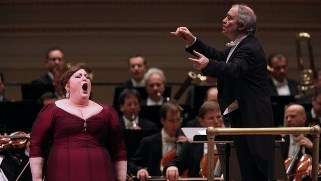|
Back
Strengths and Weaknesses from a Russian Hand New York
Isaac Stern Auditorium, Carnegie Hall
02/27/2016 - & February 20, 21*, 2016 (Wien)
Modest Mussorgsky: Prelude to Khovanshchina (orch. Shostakovich)
Olga Neuwirth: Masaot/Clocks Without Hands
Richard Wagner: Selections from Götterdämmerung
Heidi Melton (soprano)
The Vienna Philharmonic Orchestra, Valery Gergiev (conductor)

H. Melton, V. Gergiev (© Steve Sherman)
The Vienna Philharmonic’s residency continued last night with a second concert led by celebrity guest conductor Valery Gergiev. As was the case in the first concert, the major strength on display was in the Russian repertoire, introduced here by the short prelude to Mussorgsky’s long and convoluted political opera Khovanshchina. Less than five minutes of music captured the opera’s clash between religious fanaticism and political intrigue, both gorgeously proclaimed by the Vienna players.
Moving on to the New York premiere of a specially commissioned work by the Austrian composer Olga Neuwirth, Gergiev still retained a firm hand. The intriguing Masaot/Clocks Without Hands was inspired by visions of Neuwirth’s grandfather, whom she never knew, as experienced in dreams. It is a sharp, disjointed piece intended to capture a collapse in conceptions of linear time – hence the idea of the hands of a clock fading away. The score looks back to atonality in a way that could be thought retrograde, yet it refreshingly avoids the tendency of so many modern compositions to resemble unmemorable film scores. It is hard to imagine Neuwirth’s piece will suffer their all too common fate and rapidly disappear from concert repertoires. Present in the hall, she was warmly applauded by the Carnegie audience, much of which had come for the Wagner’s selection that comprised the program’s second half. A brief incident with a security guard who did not seem to know that she was expected to rise from the audience to the stage made the moment all the more memorable.
It was in the Wagner selection, however, that Gergiev seemed to reach his limitations. While much of his approach to the composer is sound and can even approach the level of compelling sublimity, his work with the Ring has sounded like a work in progress ever since 2003, when his home house, St. Petersburg’s Mariinsky Theater, presented its first Ring since before World War I. Although he has delivered Rheingolds and Walküres with consistent allure, Gergiev never did seem to master at a virtuoso level the more complex scores of the composite work’s last two operas, Siegfried and Götterdämmerung. Selecting the signature orchestral music from the latter of the two less practiced works revealed this with disappointing languor. The "Rhine Journey" music was almost casual. "Siegfried’s Funeral March" lacked the necessary punch. One could almost feel the frustration of the Vienna players, who know this music like the back of their hands. The addition of the Immolation Scene, with soprano Heidi Melton as Brünnhilde, compounded the disappointment as she proceeded to sharp on many of the role’s treacherous high notes while Gergiev seemed determined to keep the orchestra from overwhelming her. Only in the final three or four minutes, when the orchestra takes over, did pure musical gold pour into the stalls. There was no encore.
Paul du Quenoy
|